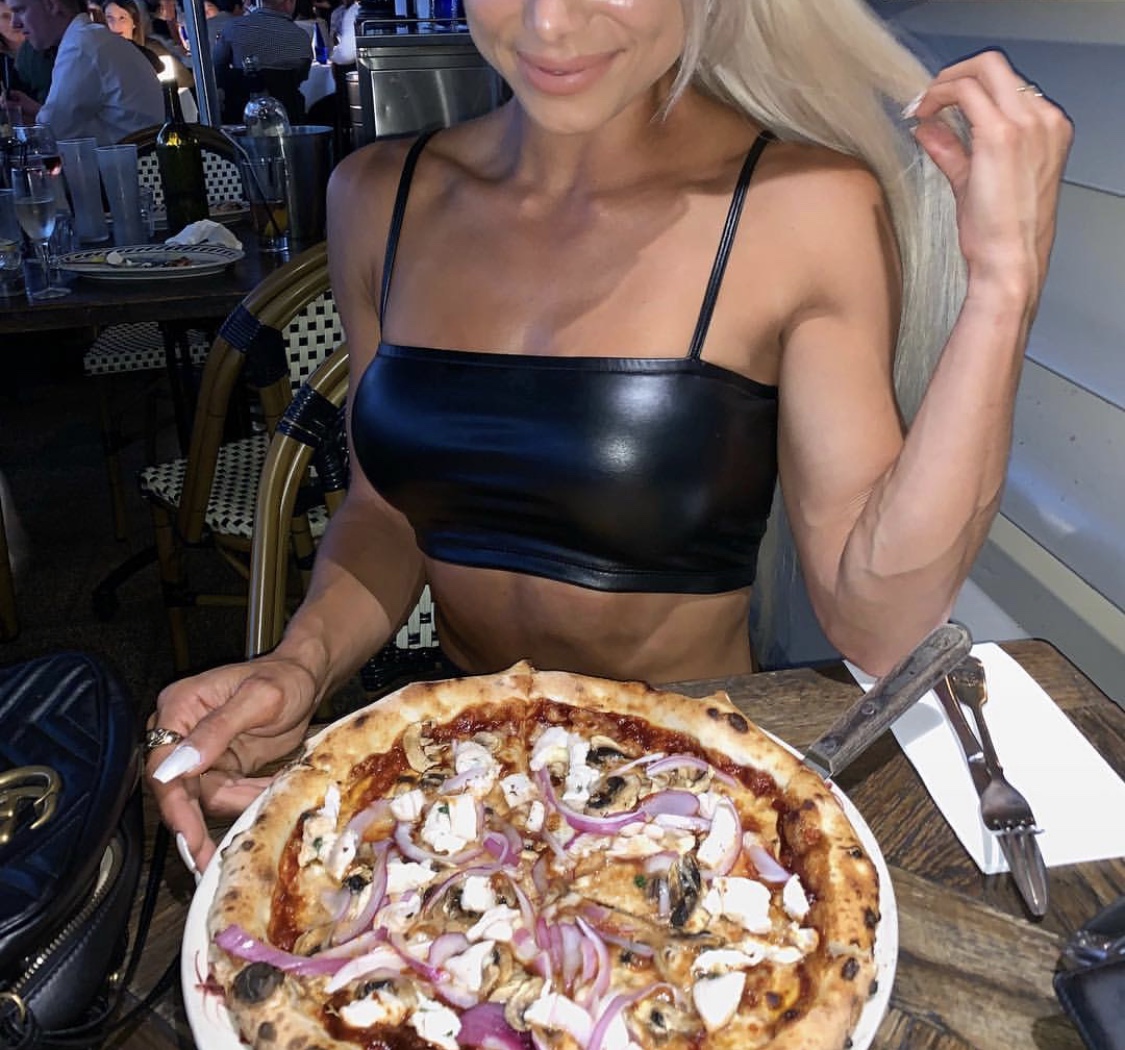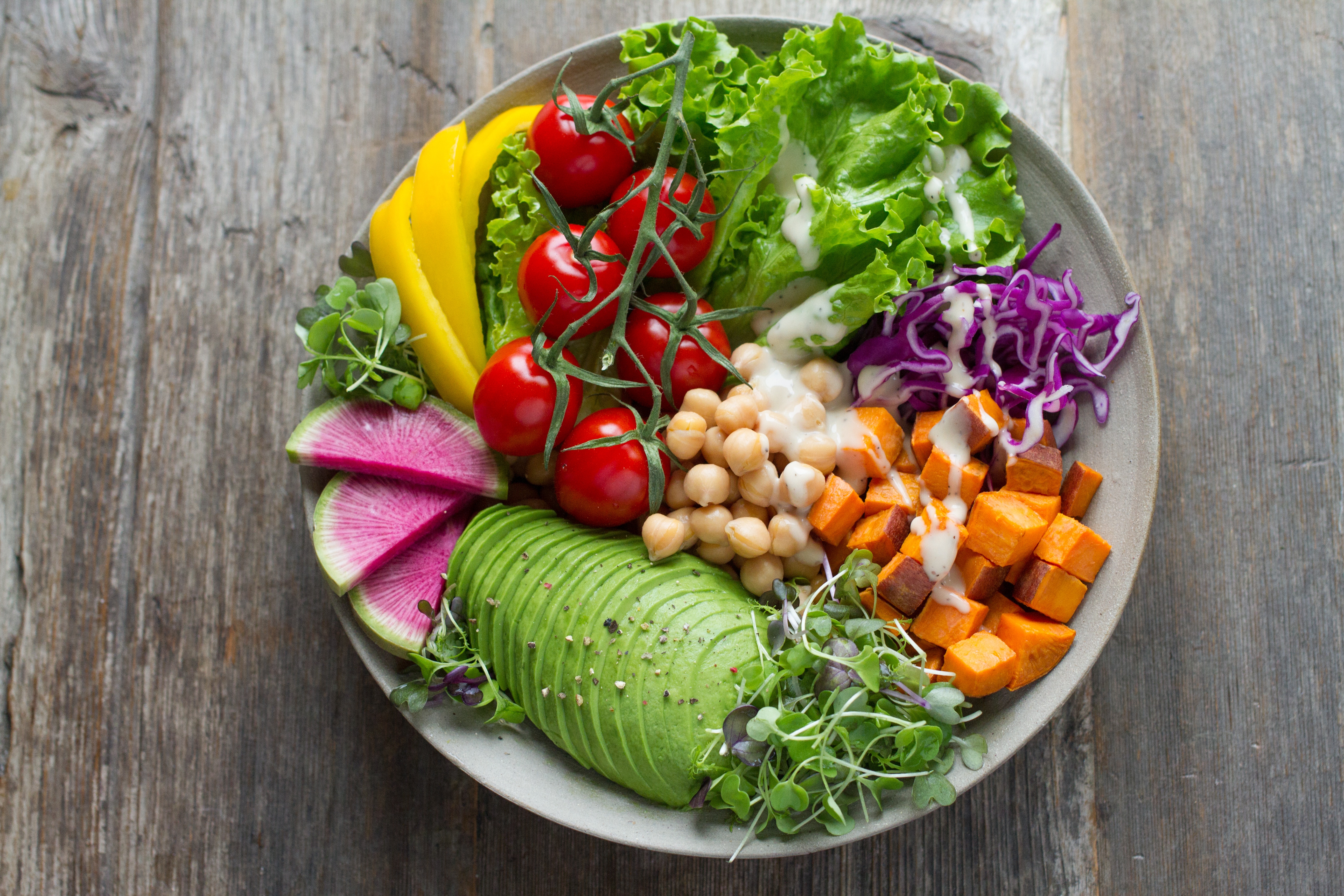Lots of you ask, how can I still drop fat and not have to worry about counting all these calories? Such a great question! 🙂
Let’s start off first with a couple things.
#1: I’m not someone who really counts calories, I find it to be a bit too obsessive and coming from a background of just obsessing about numbers and food, I really think it’s important to be really in tune with your own body and what feels best for you.
Listen, we’re all different and I get we all have different phases. Some of us can handle, you know, being a bit more flexible with our diet. Some of us can have a bit more intuition around our food, but personally, I really believe a lot of my mission is not around, okay, how many macronutrients do I need or how many calories do I need?
I think it’s more of what does YOUR body need to feel healthy and vibrant and alive, not so much how can you eat to make sure you’re as lean as possible and I totally get it. I think there’s such a big gap in the industry and in health and wellness in general where women think they either have to be 100 percent fat loss and restrictive and you know, really watching their calories and really trying to be super diligent about being ridiculously lean and others were like, no, you have to be super body positive.
IT’S NOT ONE OR THE OTHER.
You have to love your body all the time. You can eat donuts, you can do whatever. You don’t have to worry about it. And I don’t think either, right? I think there’s a middle ground to all of this, right? I don’t feel body positivity really is about eating a ton of doughnuts and feeling amazing about yourself.
Nor do I feel like getting super lean and obsessing about food and calories and macros doesn’t make you any leaner or give you an advantage over anyone, if you will. So the main question is how can you drop fat and be in the fat loss state without counting calories and without obsessing. So I know some of you asked me about macros. Hey, how can you help me out with macro counting? How can you help me out with calorie counting? And to be honest, I don’t do that.
I feel like it’s kind of lazy in a sense because I’m not here to tell you exactly what to do. I’m here to help coach you and guide you to be a better version of yourself and learn to tap into your own intuition.
Because if I’m to sit here and say, okay, Renee. Okay, Julie. Okay, Sarah, I want you guys to focus on 1400 calories. I want you to get 120 grams of protein, 50 carbs, 50 grams of fat, whatever that would drive you crazy. At least for me, it would. And guess what? That’s not allowing you to take responsibility for your health. And that’s not allowing you to be independent and feel a sense of freedom about your own choices. So ultimately the goal is to gain your own sense of self-trust and self-confidence. So how can you begin to do that?
All right, let’s start with the myth of people think the whole macro counting. Well, if it just fits in your macros and you can eat it. Um, so then you see fitness professionals having these chiseled abs and they’re eating this huge donut while saying, see what I can do, I can eat this stuff and still be super lean and it’s bullshit. Here’s the deal. You have no idea what’s going on on the other side of that, how much effort and time they’re putting into their training and their diet and they’re probably eating steamed broccoli and chicken all the time.
I’ve been in the industry long enough to know that’s what happens and they only show the glamorous side, the glamorous side of eating and how, oh, she’s so lucky. She’s so and so. She knows she’s so fit and she gets to eat a donut or pizza.

So here’s the deal. If it fits your Macros, I’m not a fan and here’s why. Our bodies are all biologically different ourselves and how our body responds to food is constantly communicating with us. So if you think, wow, guess what? I didn’t meet my carbohydrate needs for today. So that means that can have a big donut all. Well, that’s fine. I’m not saying donuts are bad, but if that’s your sole focus that you choose, I challenge you to kind of think outside the box because a doughnut is gonna have a totally different impact on your blood sugar and your insulin in your body than a sweet potato would. So let’s say that you have, I’m just throwing it out there, I don’t know, let’s say if you did the macro counting and you have 50 grams of carbs left or something and you’re like, okay, well I’m going to eat that donut.
So all calories are equal? It’s just a calorie.
As long as I’m under my calorie needs and I can eat whatever I want, then yes and no, because again, our body’s totally going to respond differently to a donut versus a sweet potato, right?
A doughnut. Our blood sugar’s going to spike. It’s going to make us more hungry. It’s going to manifest into more cravings. It’s gonna make us have this cascade of events of wanting to eat more food. Again, it’s going to spike our blood sugar. We’re going to be hungry an hour later versus a sweet potato. Okay?
Yes. It has more natural sugar in it. Yes, it’s a carbohydrate, but it’s a root vegetable. You’re getting a ton of nutrients and the sweet potato, you’re getting a ton of fiber, a ton of vitamin A and it’s going to release slower and your blood sugar. So as you can see, that’s why I feel like macros or not super important.
I feel like so much of it is how you eat what you put in your system, right? Your body again is going to respond completely differently to a sweet potato, a whole food rather than a donut. Alright? So again, with the Macros, I don’t do that. I honestly really don’t know how to do that. So, um, I can’t help you in that department, but I can help you with more intuitive eating with eating more whole foods, richer, nutrient-dense foods, foods that are gonna give you sustainable energy and create more vibrancy in your life because that’s ultimately what you want, right?
You don’t want to have to rely on some calculation. You don’t want to have to rely on someone else to tell you how to eat. You’re a grown woman that is super empowered, who already knows what to do.

It’s just a matter of trust in yourself. So by me saying this is exactly what you have to do, that’s just being lazy, right? That’s me saying, well here you go. And that’s not me being a good coach because I want you to be able to learn this on your own and learning and getting uncomfortable is all part of it. It’s the only way you’re going to grow. So again, number one is the myth behind macros and why I believe that, again, calories in, calories out, yes, it’s important to a certain extent, but so much of it as what you eat and that a donut and a sweet potato, they are two completely different foods and they digest in your system and they get into your cells much different. So if you didn’t listen to that, make sure to listen to that.
Then next up, let’s talk about eating real food.
Okay? So eating real food, that is so much more important than eating a bunch of process stuff, right? Keep it simple, ladies. Keep it super, super simple. Pff Protein, fat, fiber, protein, fat, fiber. Again, one more time. Protein, fat, fiber. Look at your meals. Are there a leafy Greens, dark, leafy Greens? Are you getting a ton of vegetables? You’re getting some fruits, fruits like berries and apples and peaches and pears. Are You getting cherries? Those types of fruits are great. Are you getting enough protein? Are you getting adequate protein? I can promise you the ladies who do not get enough protein tend to have higher sugar cravings, so please make sure you’re getting adequate protein, especially when you’re strength training right now, your body’s craving it and you also need it for brain function, not only for muscle development, but the protein’s going to help with your neurotransmitters, helps you with the amino acids.
Again, great for muscle rebuilding as well as brain function, so the protein is essential, and then also having a healthy fat, so avocado, some flaxseed oil, some seeds, all of those good things, such great, great nutrients for you and it’s going to keep you sustainable and it’s going to keep you satisfied. Now, if you feel like you’re still hungry and you need more calories, all right, go ahead and add some carbohydrates to that. Maybe you have, um, you know, some cane one, maybe you have some brown rice, maybe you have some sweet potato. So I try to keep it pretty simple. Um, the days that I don’t exercise much and I’m sitting a lot, I don’t really crave a lot of carbohydrates because I’m not really moving, right. So I typically eat like a lot of protein and fat and fiber and water. Um, and then I’ll have, you know, maybe some crackers or something or a little oatmeal or something, but the days that I’m training my body craves the carbs because I’m trying to replenish my glycogen stores, meaning I’m trying to rebuild my muscle again.
One thing to focus on with the protein, I would just aim for probably 25 to 30 grams each meal. That would be a great way to start. Or you can think of your body weight. And so let’s say you weigh, um, I don’t know, I’m just gonna throw it out there. Let’s say you weigh 115 pounds. So if you’re 115 pounds then you would need around 100 grams of protein. So I would say point zero seven to one gram of protein per pound of body weight would be ideal. I like for you to start on a little bit, a lower side, that way you’re not going to get super constipated and getting adequate protein, making sure you get enough. It takes a minute. So just slowly building it up. Up to that.
Just to replenish because you’re hungry, you burned a lot. So again, protein, fat, fiber at every meal. And then if you still feel like you’re hungry, add some more carbohydrate or maybe add a little bit more protein. Um, you know, again, those are, those are all big movers and it’s really simple. You don’t have to overcomplicate it and just look at your plate. Like, okay, is my plate colorful? Is it vibrant or is it dead? Do I just have a slab of meat on it? And a white, a white potato, right? Look at it, okay, is this, is this plate a nutrient dense, right? All big things to consider there. So guys, again, keep it super, super simple. This does not have to be complicated. I want you to focus more on putting healthy quality foods into your body and not worrying so much about how many calories it has or what it’s gonna do.

Really focus on the high quality foods, okay, protein, fat, and fiber at every meal. And then also listen to your body. Pay Attention. Be Mindful. If you’re wolfing down food over the sink, you’re not going to know if you’re full right, or if you wait eight hours to eat, you’re going to be so hungry. You’re not going to know like, oh my gosh, you’re going to feel full so much, um, so much later because you are so dang hungry, right?
Um, and you waited so long to eat, so making sure you try and eat. It’s not like you have to eat every two or three hours. That myth is so busted you guys. You do not feel like you have to stuff yourself every couple hours and eat. That’s completely optional, but you really only need to eat when you’re hungry. And if you don’t know when you’re hungry, allow yourself to be a little hungry.
Wait three or four hours between each meal if you feel comfortable doing so. And I always suggest to the fullness factor, there’s a fullness factor scale. I’ll post it in here, but that’s essentially stopping at an eight, seven or an eight. So 10 is where you are so full you can’t breathe. It’s like Thanksgiving and one is you’re starving. You want to know your arm off. So you typically want to finish around a seven or eight on the fullness factor scale. And that essentially means you’re looking at your food and you’re like, yeah, I’m satisfied. I could probably eat a couple more bites, but it’s not gonna make or break me. And you can walk away from the food feeling completely satisfied. That’s something to think about too. So those are just some starters. You guys, um, so the few things, protein, fat and fiber at every meal and in carbohydrates on the days you exercise and you’re hungry and adding a bit more fat when you need if you’re still hungry.
Secondly, as being more mindful and not waiting to, you’re absolutely ravenous, making sure that you’re getting really quality foods in your diet. So you’re eating whole healthy foods, not worrying so much about the calories and the, uh, the macro content. And then also finishing on the fullness factor around the seven or eight as far as the fullness factor, scale goes, right? Or fullness. Scale goes around a seven or eight where you could probably have another bite, but you’re fine, you’re satisfied. And you could go another couple of hours without eating. So hopefully this was good.
Make sure to follow me on IG and FB at KimSchaperFitness and subscribe to my FREE email list at www.kimschaper.com 🙂
To learn more about my exclusive #FitFemaleFormula method you can apply under “work with me!”

